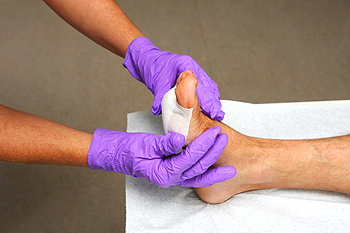Debridement of Diabetic Foot Wounds
Tuesday, 26 December 2023 00:00
Diabetic foot ulcers can lead to serious problems like amputations, infections, and a lower quality of life. These wounds take a long time to heal and can come back even after they seem better. Podiatrists often use a treatment called debridement to help. Several different debridement methods are employed to address these wounds effectively. Sharp surgical debridement involves the precise use of surgical instruments, such as scalpels, to skillfully remove dead or damaged tissue from the wound. Autolytic debridement harnesses the body's natural healing processes. It involves maintaining a moist wound environment using appropriate dressings. The body's own enzymes work to break down and liquefy dead tissue over time. Enzymatic debridement uses specialized ointments or gels containing enzymes applied to the wound. These enzymes actively break down necrotic tissue, aiding in its removal. Enzymatic debridement products are available by prescription. Other types of debridement exist. If you have a diabetic foot ulcer that needs extra care, it is strongly suggested that you make an appointment with a podiatrist to discuss debridement as a healing treatment and the precise type that would be best for your individual needs.
Wound care is an important part in dealing with diabetes. If you have diabetes and a foot wound or would like more information about wound care for diabetics, consult with one of our podiatrists from Bazzi Podiatry. Our doctors will assess your condition and provide you with quality foot and ankle treatment.
What Is Wound Care?
Wound care is the practice of taking proper care of a wound. This can range from the smallest to the largest of wounds. While everyone can benefit from proper wound care, it is much more important for diabetics. Diabetics often suffer from poor blood circulation which causes wounds to heal much slower than they would in a non-diabetic.
What Is the Importance of Wound Care?
While it may not seem apparent with small ulcers on the foot, for diabetics, any size ulcer can become infected. Diabetics often also suffer from neuropathy, or nerve loss. This means they might not even feel when they have an ulcer on their foot. If the wound becomes severely infected, amputation may be necessary. Therefore, it is of the upmost importance to properly care for any and all foot wounds.
How to Care for Wounds
The best way to care for foot wounds is to prevent them. For diabetics, this means daily inspections of the feet for any signs of abnormalities or ulcers. It is also recommended to see a podiatrist several times a year for a foot inspection. If you do have an ulcer, run the wound under water to clear dirt from the wound; then apply antibiotic ointment to the wound and cover with a bandage. Bandages should be changed daily and keeping pressure off the wound is smart. It is advised to see a podiatrist, who can keep an eye on it.
If you have any questions, please feel free to contact one of our offices located in Detroit, West Detroit, Northwest Detroit, Sterling Heights, Hamtramck, Dearborn Heights, Madison Heights, Redford, and Livonia, MI . We offer the newest diagnostic and treatment technologies for all your foot care needs.




